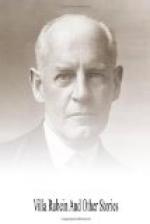Late in the afternoon the old miner touched Scorrier’s arm, and said: “There he is—there’s my boy!” And he departed slowly, wheeling the body on a trolley.
As the sun set, the gang below came up. No further search was possible till the fumes had cleared. Scorrier heard one man say: “There’s some we’ll never get; they’ve had sure burial”
Another answered him: “’Tis a gude enough bag for me!” They passed him, the whites of their eyes gleaming out of faces black as ink.
Pippin drove him home at a furious pace, not uttering a single word. As they turned into the main street, a young woman starting out before the horses obliged Pippin to pull up. The glance he bent on Scorrier was ludicrously prescient of suffering. The woman asked for her husband. Several times they were stopped thus by women asking for their husbands or sons. “This is what I have to go through,” Pippin whispered.
When they had eaten, he said to Scorrier: “It was kind of you to come and stand by me! They take me for a god, poor creature that I am. But shall I ever get the men down again? Their nerve’s shaken. I wish I were one of those poor lads, to die with a smile like that!”
Scorrier felt the futility of his presence. On Pippin alone must be the heat and burden. Would he stand under it, or would the whole thing come crashing to the ground? He urged him again and again to rest, but Pippin only gave him one of his queer smiles. “You don’t know how strong I am!” he said.
IV
He himself slept heavily; and, waking at dawn, went down. Pippin was still at his desk; his pen had dropped; he was asleep. The ink was wet; Scorrier’s eye caught the opening words:
“Gentlemen,—Since this happened I have not slept....”
He stole away again with a sense of indignation that no one could be dragged in to share that fight. The London Board-room rose before his mind. He imagined the portentous gravity of Hemmings; his face and voice and manner conveying the impression that he alone could save the situation; the six directors, all men of commonsense and certainly humane, seated behind large turret-shaped inkpots; the concern and irritation in their voices, asking how it could have happened; their comments: “An awful thing!” “I suppose Pippin is doing the best he can!” “Wire him on no account to leave the mine idle!” “Poor devils!” “A fund? Of course, what ought we to give?” He had a strong conviction that nothing of all this would disturb the commonsense with which they would go home and eat their mutton. A good thing too; the less it was taken to heart the better! But Scorrier felt angry. The fight was so unfair! A fellow all nerves—with not a soul to help him! Well, it was his own lookout! He had chosen to centre it all in himself, to make himself its very soul. If he gave way now, the ship must go down! By a thin thread, Scorrier’s hero-worship still held. ‘Man against nature,’ he thought, ’I back the man.’ The struggle in which he was so powerless to give aid, became intensely personal to him, as if he had engaged his own good faith therein.




